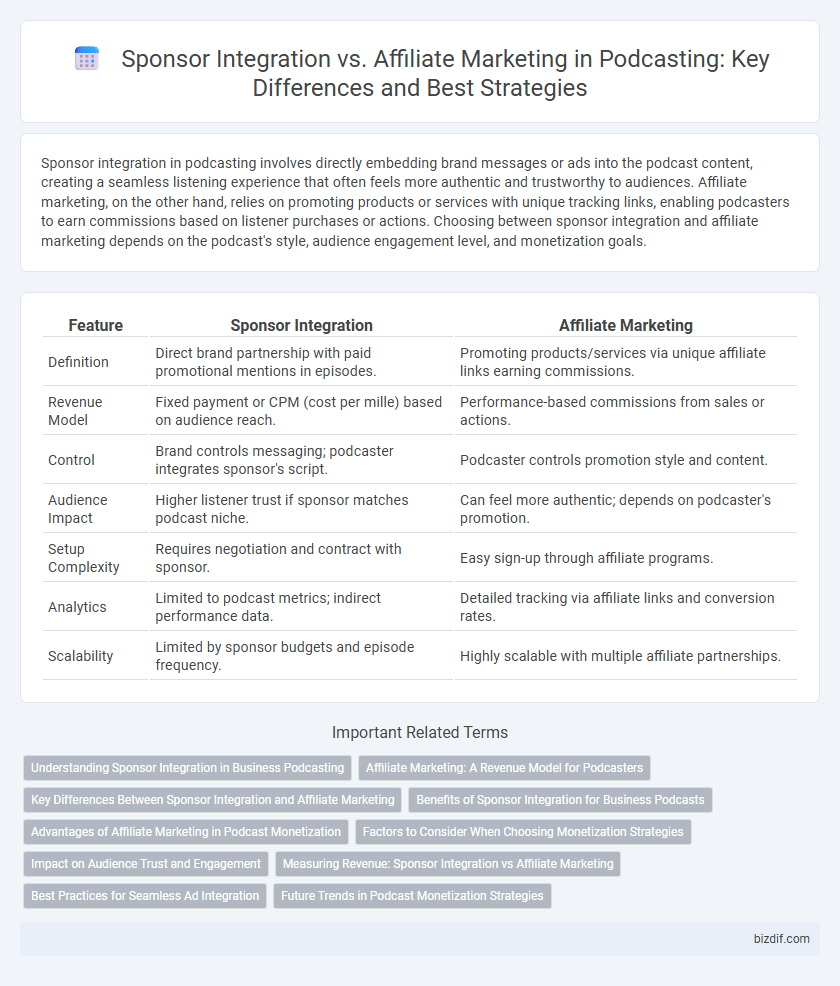Sponsor integration in podcasting involves directly embedding brand messages or ads into the podcast content, creating a seamless listening experience that often feels more authentic and trustworthy to audiences. Affiliate marketing, on the other hand, relies on promoting products or services with unique tracking links, enabling podcasters to earn commissions based on listener purchases or actions. Choosing between sponsor integration and affiliate marketing depends on the podcast's style, audience engagement level, and monetization goals.
Table of Comparison
| Feature | Sponsor Integration | Affiliate Marketing |
|---|---|---|
| Definition | Direct brand partnership with paid promotional mentions in episodes. | Promoting products/services via unique affiliate links earning commissions. |
| Revenue Model | Fixed payment or CPM (cost per mille) based on audience reach. | Performance-based commissions from sales or actions. |
| Control | Brand controls messaging; podcaster integrates sponsor's script. | Podcaster controls promotion style and content. |
| Audience Impact | Higher listener trust if sponsor matches podcast niche. | Can feel more authentic; depends on podcaster's promotion. |
| Setup Complexity | Requires negotiation and contract with sponsor. | Easy sign-up through affiliate programs. |
| Analytics | Limited to podcast metrics; indirect performance data. | Detailed tracking via affiliate links and conversion rates. |
| Scalability | Limited by sponsor budgets and episode frequency. | Highly scalable with multiple affiliate partnerships. |
Understanding Sponsor Integration in Business Podcasting
Sponsor integration in business podcasting involves embedding brand messages directly into the content, creating a seamless listening experience that enhances brand recall and listener trust. Unlike affiliate marketing, which relies on performance-based commissions from product referrals, sponsor integration focuses on building long-term partnerships that emphasize brand alignment and audience engagement. Effective sponsor integration leverages the host's credibility and tailored messaging to drive brand awareness and foster deeper connections with a niche business audience.
Affiliate Marketing: A Revenue Model for Podcasters
Affiliate marketing offers podcasters a scalable revenue model by promoting products or services directly linked to their audience's interests, generating commissions on each sale. Unlike sponsor integration that relies on flat fees or fixed contracts, affiliate marketing incentivizes podcasters based on performance, aligning income with listenership engagement. This model leverages trackable links and analytics, allowing podcasters to optimize content and maximize affiliate conversions effectively.
Key Differences Between Sponsor Integration and Affiliate Marketing
Sponsor integration involves direct partnerships where brands pay podcast creators to feature their products or services within episodes, often with customized messaging and brand alignment. Affiliate marketing relies on podcasters promoting products using unique tracking links or codes to earn commissions based on sales generated through their referrals. Key differences include payment models--fixed fees versus performance-based earnings--and the level of content control, with sponsor integration typically requiring tailored ad content, while affiliate marketing offers more flexibility in promotion style.
Benefits of Sponsor Integration for Business Podcasts
Sponsor integration in business podcasts enhances brand visibility by seamlessly embedding sponsor messages within content, leading to higher listener engagement and trust. This approach builds long-term partnerships and consistent revenue streams through tailored advertising that aligns with the podcast's audience. Unlike affiliate marketing, sponsor integration creates a more authentic connection that boosts both sponsor credibility and podcast growth.
Advantages of Affiliate Marketing in Podcast Monetization
Affiliate marketing in podcast monetization offers greater scalability and passive income potential by allowing podcasters to promote multiple products without exclusive commitments. It provides flexibility in content alignment, enabling seamless integration of relevant products that resonate with diverse audience segments. Detailed tracking and performance-based commissions make affiliate marketing a cost-effective and measurable revenue stream compared to fixed sponsor integration.
Factors to Consider When Choosing Monetization Strategies
Sponsor integration offers direct brand collaboration with tailored advertisement placement, often yielding higher upfront revenue but requiring negotiated contracts and listener trust. Affiliate marketing depends on performance-based commissions tied to listener purchases or actions, providing flexibility and passive income but typically lower immediate payouts. Choosing between the two depends on podcast audience size, engagement levels, content niche, and long-term revenue goals to maximize monetization efficiency.
Impact on Audience Trust and Engagement
Sponsor integration in podcasting often enhances audience trust by aligning brands with a host's authentic voice, fostering deeper engagement through personalized endorsements. Affiliate marketing, while effective for driving conversions, can sometimes feel sales-driven, potentially diminishing listener trust when promotional content appears less genuine. Maintaining transparency and relevance in both approaches is crucial to maximizing listener loyalty and sustained engagement.
Measuring Revenue: Sponsor Integration vs Affiliate Marketing
Sponsor integration in podcasting typically generates more predictable revenue through fixed contracts and guaranteed payments, allowing precise revenue measurement over a set period. Affiliate marketing revenue fluctuates based on listener actions and conversion rates, making tracking dependent on real-time data analytics and performance metrics. Accurate revenue measurement requires integrating tracking tools and analyzing listener engagement for both monetization strategies.
Best Practices for Seamless Ad Integration
Effective sponsor integration in podcasting involves aligning the brand message naturally within the content to maintain listener engagement and trust. Affiliate marketing requires transparent disclosure and seamlessly embedding product mentions without disrupting the narrative flow. Leveraging data-driven targeting and consistent ad placement optimizes listener response and maximizes revenue opportunities.
Future Trends in Podcast Monetization Strategies
Sponsor integration in podcasts is evolving with dynamic ad insertion and personalized messaging, enhancing listener engagement and advertiser value. Affiliate marketing is projected to expand through AI-driven product recommendations, boosting conversion rates and revenue streams. Emerging trends in podcast monetization emphasize data analytics and cross-platform integration, enabling creators to optimize sponsorship and affiliate strategies effectively.
Sponsor integration vs affiliate marketing Infographic

 bizdif.com
bizdif.com